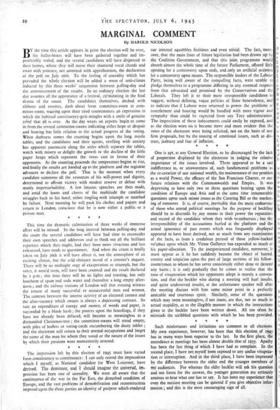MARGINAL COMMENT
NICOLSON By HAROLD
BY the time this article appears in print the election will be over, the ballot-boxes will have been gathered together and im- penetrably scaled, and the several candidates will have dispersed to their homes, where they will nurse-their shattered vocal chords and await with patience, not unmixed with apprehension, the declaration of the poll on July 26th. To the feeling of unreality which has pervaded the whole election will be added a sense of anti-climax induced by this three weeks' suspension between polling-day and the announcement of the results. In an ordinary election the last day assumes all the appearance of a festival, cu'minating in the final drama of the count. The candidates themselves, decked with ribbons and rosettes, dash about from committee-room to com- mittee-room, wearing upon their tired countenances an expression in which the habitual constituency-grin mingles with a smile of genuine relief that all is over. As the day wears on reports begin to come in from the several committee-rooms indicating either hope or despair and bearing but little relation to the actual progress of the voting. When darkness comes the counting begins upon the long trestle tables, and the candidates and their agents, strolling with anxiety but apparent unconcern along the aisles which separate the tables, watch with misery or delight the growth or the decline of the little paper heaps which represent the votes cast in favour of their opponents. As the counting proceeds the temperature begins to rise, and finally the results are handed up to the platform and the registrar advances to declare the poll. That is the moment when every candidate summons all the resources of his will-power and dignity, determined to affront victory with modest reserve or defeat with manly imperturbability. A few fatuous speeches are then made, and amid the hoots and cheers of the multitude the candidate struggles back to his hotel, either tingling with triumph or numbed by failure. Next morning he will pack his clothes and papers and return to London, conscious that he is now either a public or a private man.




























 Previous page
Previous page